CubaDebate 174
Workers must create their company’s plan

Cuban Minister of Economy:
Workers Must Create Their Company’s Plan for 2020
Alejandro Gil, Minister of Economy and Planning, at the eighth Congress of the National Association of Economists and Accountants of Cuba. Photo: Ariel Ley Royero/ ACN.
 By Lissett Izquierdo, Cubadebate journalist. Graduated from the University of Havana (2014). She worked at the Cuban News Agency from 2011 until September 2018.
By Lissett Izquierdo, Cubadebate journalist. Graduated from the University of Havana (2014). She worked at the Cuban News Agency from 2011 until September 2018.
and Ferrer Ariel Ley Royero
Translated and edited by Walter Lippmann for CubaNews.
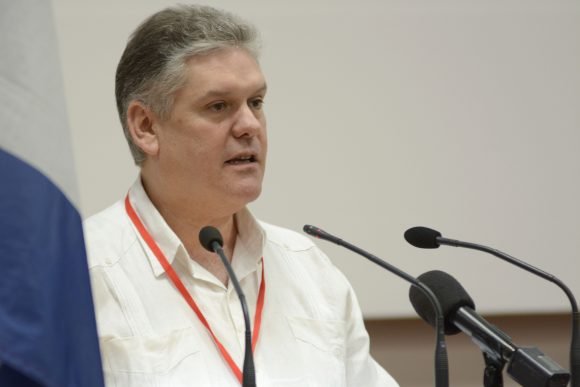
Alejandro Gil, Minister of Economy and Planning, at the eighth Congress of the National Association of Economists and Accountants of Cuba. Photo: Ariel Ley Royero/ ACN.
The Cuban economy plan for 2020 will have a new conception: it will be elaborated without specific directives or limits, since it will come out of the active participation of workers in each company, informed Alejandro Gil, Minister of Economy and Planning (MEP), this Wednesday.
Speaking at the inaugural session of the VIII Congress of the National Association of Economists and Accountants of Cuba (ANEC), at the Havana Convention Center, the Minister argued that planning will become a collective construction, in which the potentialities of the country’s entities are identified.
Gil reminded the delegates and guests that up to the moment a global model of the economy was made, from which the specific directives for sectors came out, that is to say, the requests for goods and services, as well as the pre-defined level of imports and exports that the economy would have.
According to Gil, now “there is no straitjacket,” but we will have to be objective, realistic and conscious. This new way, demanded for years by the workers, also requires a change of mentality, because “there will be those who are used to the numbers coming from above,” said the minister.
For this reason, he said, this process – which is currently taking place in the labor collectives – will require the support of ANEC and the Central de Trabajadores de Cuba (CTC). “The plan that is built has to be by nature more efficient than the one that came from the top down.
Gil ratified that for next year, in the midst of the restrictions that the country presents and the tightening of the blockade imposed by the United States, growth and development can be guaranteed due to the existence of human capital, a national industry with potentialities to be better exploited and a more diversified foreign trade.
Among the priorities, he mentioned activities related to food production, housing programs, transportation, computerization and medicines. The financing of national industry will also take precedence.
In the words of the head of the MEP, one of the problems that hinders the performance of the Cuban economy is the persistence of a mentality that is highly dependent on imports. In recent years there has been a trend towards increasing purchases abroad, which has an impact today, he argued.
He explained that goods are imported that with efforts can be produced within the country. For example, animal feed for pigs, because when there are failures in their purchase, the production and commercialization potholes appear, as happened in the last quarter of last year.
“The economy must prepare itself to gradually reduce these purchases, although it will not be resolved immediately,” he said.
In agreement with Gil, one of the ways to strengthen national industry is to promote productive chains, based on policies and financial incentives. It has also been conceived to strengthen local development projects, based on the use of the endogenous resources of the territories.
Another topic discussed by the Minister of Economy was that of investments. He commented that not infrequently there are differences between feasibility studies and yields. In these studies, scientific rigor must prevail, he said.
He added that the return on investment is little analyzed, when the most important thing is the examination of the expected result of the investment and how it impacted the economy.
Economists committed to the development of their country
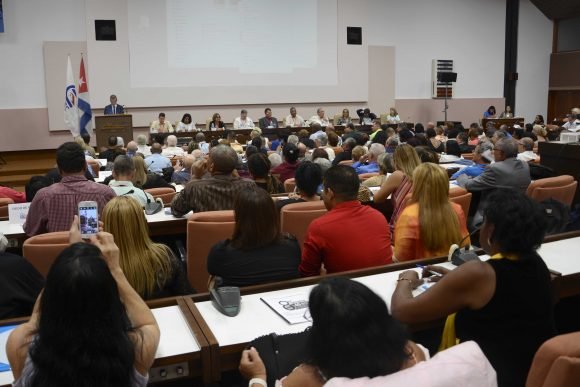
Eighth Congress of the National Association of Economists and Accountants of Cuba, at the Havana Convention Center. Photo: Ariel Ley Royero/ ACN.
In the opening remarks, Oscar Luis Hung Pentón, president of ANEC, reiterated the commitment of the more than 80,200 members of the organization to the process of updating the Cuban economic model.
In reviewing ANEC’s performance in recent years, Hung Pentón highlighted the activity of improvement, especially of officials and specialists in the state sector of the economy, as well as the development of science.
On the other hand, the working links between ANEC and the Permanent Commission for the Implementation and Development of the Guidelines constitute an expression of the close communication existing today between the governmental structures, directly involved in the transformations of the economy, and the prevailing Cuban economic thought in the civil society, said the expert.
The meeting was attended by Jorge Cuevas Ramos, member of the Secretariat of the Central Committee of the Party and Head of its Economic Department; Meisi Bolaños, head of Finance and Prices; and Abel Prieto, director of the Martiano Program Office and president of the José Martí Cultural Society.
Epistolary of a Time

Epistolary of a Time:
Che Guevara Lived Through His Letters
By István Ojeda Bello
Translated and edited by Walter Lippmann for CubaNews.
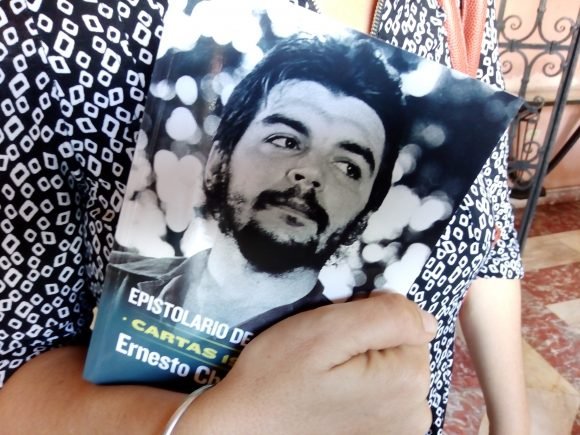
In the book Epistolario de un tiempo. Letters 1947-1967 Ernesto Guevara brings together Che’s most famous missives Photo: István Ojeda Bello/ Cubadebate.
For the first time, readers have in the same volume all the known letters of our Heroic Guerrilla, thanks to the joint effort of Ocean Sur Publishing House and Che Guevara Study Center with the Epistolary book of a time. Letters 1947-1967 Ernesto Guevara.
The text was presented this Friday at the Casa de la Amistad in Havana with the presence of relatives of the Argentinean-Cuban revolutionary fighter; and Fernando Rojas, Vice-Minister of Culture; Fernando González, Hero of the Republic of Cuba and president of the Cuban Institute of Friendship with the Peoples, as well as Adán Chávez Frías, ambassador of the Bolivarian Republic of Venezuela in our country.
In Epistolario de un tiempo… Che’s most famous missives converge, such as his farewells to the Cuban people and their children, along with another appreciable number of letters that denote his communication with figures of the politics, art and society of his time, such as Haydée Santamaría, Armando Hart, Celia Sánchez, Carlos Rafael Rodríguez, Regino G. Boti, Nicolás Guillén, Ernesto Sábato or Lisandro Otero, as well as his messages or reflections with institutions, media and ordinary citizens.
Many of these documents had remained unpublished until now, noted researcher Disamis Arcia Muñoz who along with Dr. Maria del Carmen Ariet Garcia was in charge of the compilation.
This book, he emphasized, helps to clarify controversial moments in the life of the Guerrilla of America as his discrepancies with other revolutionary fighters; but also to give a more intimate look to his conversations with close friends and even with strangers.
Arcia Muñoz stressed the importance of making known the epistle that Che sent to Fidel Castro on March 26, 1965. It, he affirmed, together with Socialism and Man in Cuba, and its inconclusive Critical Notes on Political Economy, completes the Guevara triad of thinking about the Cuban Revolution from its external projection, its technological development and the problems of socialist transition.
When reading several passages of the text, Aleida Guevara March noted that many of the realities described by her father can be appreciated in contemporary times. She also emphasized how, through the letters, we know this tender and paternal angle of a man who articulated sensitivity and sense of humor with a high sense of duty and self-criticism. “In this book you can find those things,” she concluded.
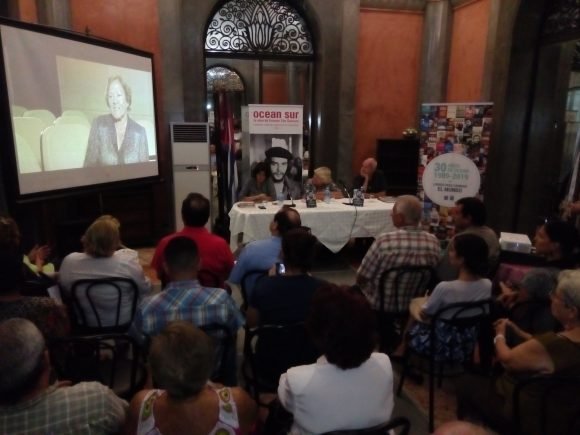
Presentación del libro Epistolario de un tiempo. Cartas 1947-1967 Ernesto Guevara. Foto: István Ojeda Bello/ Cubadebate.
How Does Google Get Away With It?

How does Google get away with always knowing where you are?
Translated and edited by Walter Lippmann for CubaNews.

The services Google offers on devices with Android and iOS operating systems store your location regardless of terminal settings. Photo: TECHcetera.
The services Google offers on devices with Android and iOS operating systems store your location regardless of terminal settings. Kevin Curran, professor of computer security at the Faculty of Computer Science and Engineering at the University of Ulster (Ireland) explains to Sputnik how Google gets away with it.
“In 2007, it was discovered that Google logged climate access points using the company’s vehicles on the streets. In 2017 we saw the company sell the unique addresses of cell phones stored on telephone poles. Now we’ve discovered that when you deactivate the location, data is still transmitted when we receive weather updates,” Curran explains to Sputnik.
In other words, Google knows where you are even though you’ve explicitly disabled location settings in your cell phone settings. Curran points out that the blame lies with the custom ads in the applications. Between April and June, Google made $32 billion in profits, 90 percent of which came from advertising.
“People find it cheaper to buy ads to show on their cell phones, but Google doesn’t make much money from them. What’s really important for Google is to know where you are,” he explains. So the company offers those who buy those ads a tool that gives them access to data related to the demographics of a particular region, allowing them to target the people they’re interested in. That’s how Google makes real money.
“The more data – especially about the location – the more ads and the more benefits for Google. So what they really want is for you not to deactivate your location history. That’s why they tell you that [giving up your location] will make the ads more specific and the services they can offer you will be better. And to a certain extent, it’s true,” the specialist points out.
The problem would not exist if the settings of the device gave the user full authority over their personal data. If, when deactivating the location, it would not end up in the hands of third parties. But the problem exists and it is then when the responsibility falls on the company. Google should better specify what the user gets and doesn’t get by disabling location settings, Curran reports.
“Some people have never entered the Google activity log, but the log shows you where you’ve been. If you have it activated (which is what most people do), you can see all the trips you’ve made, how high up the street you’ve been, and the pictures you’ve taken when you were there. If you go to Google’s ‘My Activity’ tab, you’ll see not only your search history, but also the places you’ve been,” he warns.
Also, how many times have you opened WhatsApp or any of the other apps on your mobile phone? The situation is aggravated by the fact that the vast majority of terminals on the street have Google services and applications installed. And while it happens on all Android devices, iPhone is not saved either. “Google pays Apple a lot of money to have their services on iOS,” he reveals.
“It doesn’t matter what phone you’re using. If you use Google services, they will continue to track you,” he warns.

“It doesn’t matter what phone you’re using. If you use Google services, they’ll continue to track you. Photo: NetView.
Those who returned

Those who returned
By Nelson Rodríguez Roque
Translated and edited by Walter Lippmann for CubaNews.

Lerys Aguilera
As of last February 16, it was admitted, through a circular of the Provincial Baseball Commission, the insertion in the 43rd edition of the Holguinera Provincial Series of the baseball players Lerys Aguilera and Yusmel Velázquez, who returned to Cuba before the historic agreement between the U.S. Major Leagues and the ball of the Island.
Those who are trying to sabotage the December 19 pact are deaf to stories like those of these boys, victims of human trafficking, but officially returned to the national sport, as evidenced by the fact that they represent their respective municipalities and are invited to the Holguin Stars Game, to be held on Dec. 31 at the Feliú Leyva Stadium in the City of Parks.
– “It’s inhumane what happens to you.”
An extreme situation is traumatic for any human being. That’s when the fibers of what’s made have to come out. This was experienced by Lerys Aguilera, when he decided to leave his country in April 2014 and try on another baseball. Before he emigrated, he was a consolidated figure in our National Series.
Born in Levisa (1985), Mayarí, province of Holguín, “El Búfalo”, at the time of his departure, had played 11 seasons on the Island and had 108 home runs and 434 runs-batted-in. Generally, he occupied the fourth wood of the holguinero representative.
– You declared that you did not advise anyone to take that path…
“Really, I said it and I reaffirm it, because it is something inhuman that happens to you, you become a bait, a commodity. You risk your life, in the end you go through moments you can’t even imagine. In good Cuban, they are siren songs, they promise you and say a lot, but not even 80 percent of that is fulfilled. Unfortunately, I had to live that experience. It’s a good thing I’m still here, to be able to tell it.
– You also talked about your journey in the illegal boat trip.
“I wouldn’t do it again at all. I was in danger twice. I have no idea where we’re going. I almost drowned, even knowing how to swim, but I was in a situation in which, due to ignorance, the clothes, the backpack and other things I carried weighed heavily on me. If I don’t grab the boat well, I fall and nobody would wait for me, as the night was a wolf’s mouth. It’s unspeakable.
– What are the conditions of the Cuban baseball players who do not win contracts and live in the Dominican Republic?
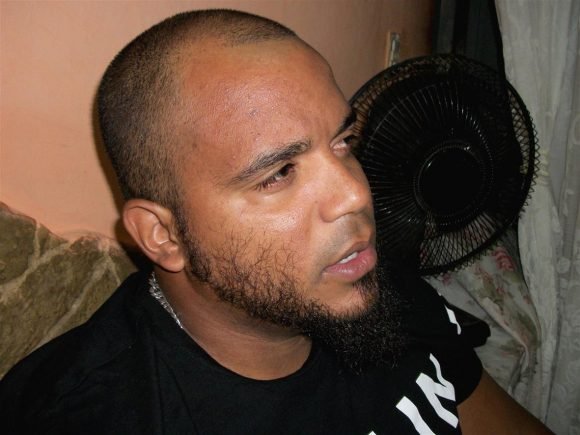
Lerys Aguilera
“It’s an odyssey what they live, we communicate continuously and it’s hard to be like this. When you can’t reach opportunities to play in the U.S. or elsewhere, everything becomes a save yourself. You have to do the unspeakable and work in jobs you’ve never done before, to have an economic income that allows you to survive.
“There are many young people who are in the Dominican Republic ‘eating a cable’, in good Cuban I tell you, having a tremendous job. Without support, without hope. I was able to receive help from many people, even before I left for Nicaragua, but not everyone is so lucky. It has been and continues to be difficult for the Cuban baseball players there.
– Many of them illegal?
“Yes, it’s the safest thing. What happens, most of them do their migratory procedures, stay, in Haiti. But once they cross into the Dominican Republic they become illegal. They are from here to there or they are deported. I managed to get my Dominican identity card, which I first saw as a way of being legal, but then it allowed me to be hired. On October 11, 2017, after coming into contact with the Boer Indians, I left for Nicaragua.
– Do you think that other baseball players can be seen with no apparent way out, like you?
“Of course, it’s desperate. When they cease to have an interest in you, everything becomes more complex. The issue of age can also marginalize you. I spend a lot of time thinking about everything I’ve been through. I had depressions and even tried to attack my life. I suffered from extreme hunger in the Dominican Republic and other very hard moments. I had to train on my own. Thanks to the Lord, those kinds of situations didn’t go to the extreme in me and I didn’t carry out my thoughts.
“What is being done now with legal hiring is a magnificent thing. The baseball players can return to their country without any problem. That’s the way I recommend. Ignore the propositions. The opportunities Cuba opens are the right ones.
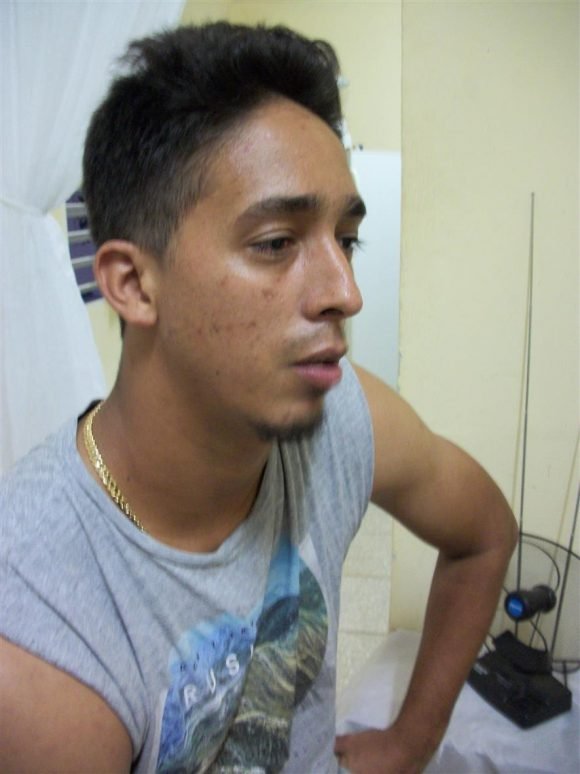
Yusmel Velázquez
– Another Puppy in “return plan”
2015 was a record year in terms of departures of players from the country, legal or illegal. Some, such as colleague Francys Romero, put the number at 150. Among the baseball players who left Cuba was right-handed pitcher Yusmel Velázquez, from Holguín, who had played six National Series, with 34 wins and 35 failures, but at the time was already considered the puppies’ best pitcher.
Velázquez, 27, after entering Haiti three years ago on a risky sea crossing from Maisí (Guantánamo) and staying in the Dominican Republic, returned to his province.
“He had been thinking about returning for months,” he said at home in the City of Parks. The native of the municipality of Urbano Noris is on the island since last November 4, after arriving in the company of his wife and son. But that is present. The future can play a good trick on him.
– Why did you decide to emigrate, just when you were already the pítcher leader of the holguinero staff and perhaps you could have integrated some team Cuba?
“At that moment, I went out in search of better economic conditions. Knowing that I had had good previous years, such as when I made the pre-selection for the Central American and Caribbean Games Veracruz-2014 and, personally, I thought I deserved to be on the team, but I was left out.
“Then, we were told that those of us who had been eliminated were going to the Rotterdam Tournament and then I didn’t make the trip either, without any explanation. Everyone who plays ball in Cuba aspires to become a national team and represent the country. I was a little disappointed that, on so many occasions, I had been pushed aside.
There are still some who think that signing with a U.S. franchise is just a formality. How was your particular case in the Dominican Republic?
“It’s not easy, it’s too big a change. You get to a different baseball, you face difficult training, very different from what you did in Cuba. Sometimes you have to spend several months getting in the right shape, so the Major League teams can see your skills. In the case of pitchers, they have to shoot over 90 mph. I saw very few Cubans who managed to sign.
“There’s still a lot of work going on there, because it’s hard to get hired. I came to be in the form required by the franchises, but for reasons beyond my control, for people who decided for me, I couldn’t be signed. They were three years lost, although at the same time I do not deny that I gained in experience and learning, and perhaps, with the knowledge acquired, I will be able to be a better pitcher in Cuban baseball and help my teammates.
– The “Dominican dream”…
“To the boys who go that way, I say it’s complicated. That it’s an area where you can’t believe in everyone. They, who capture us, promise many things that, in the end, when you are there, are not fulfilled. There’s a lot of ambition for money and you depend on others.
“I was never foreign to the Holguín team, I always followed it on the Internet, I was watching it all the time. Since I returned to Cuba, I didn’t miss a game at the Calixto García Stadium.
Cubans Deported from Mexico

Fifth Flight with Cubans Deported from Mexico Arrives in Havana
April 17, 2019
Translated and edited by Walter Lippmann for CubaNews.
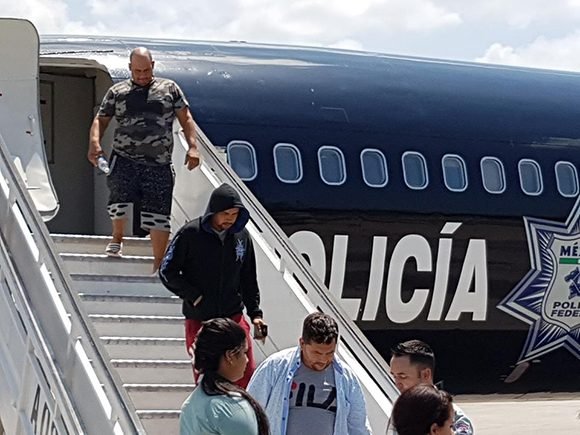
In less than a month, approximately 300 Cubans arrived on the island in five deported flights. Photo: Talia Gonzalez/ Facebook.
A new group of Cuban citizens deported from Mexico arrived in Havana on Wednesday as part of the migration agreements between the two countries.
The Mexican Federal Police aircraft landed at José Martí International Airport with people who had left the island legally, but became irregular migrants on their way to Mexico.
In less than a month, approximately 300 Cubans arrived on the island in five flights of the deported, many of them with anecdotes of vicissitudes and outrages suffered during their route through South and Central American countries bound for the United States.
As in previous cases, these human beings will return to their families after receiving the necessary attention, including health care, said immigration authorities, but said that those who left accounts pending with the legal system before leaving must face it.
The Cuban government took advantage of this situation to insist on its call for regular, orderly and safe emigration, in order to prevent people from becoming victims of criminal groups linked to human trafficking in the region.
The scenario has been complicated in recent months by the escalation in the aggressiveness of the U.S. government against the island, which includes the politicization of the flow of Cubans between both sides of the Florida Strait.
Recently, Washington reduced the period of validity of the B2 visa for Cubans from five years to three months, with only one entry, under the pretext of an alleged reciprocity with Cuba’s treatment of Americans.
Havana, through its Foreign Ministry, rejected the decision, describing it as ‘an additional obstacle to the exercise of the right of Cuban citizens to visit their relatives in that country’.
This measure adds to the closure of the services of the United States Consulate in Havana, to the unjustified interruption of the granting of visas to Cubans, forcing them to travel to third countries without any guarantee, and to the failure to comply with the visa quota established by the migratory agreements, he stressed.
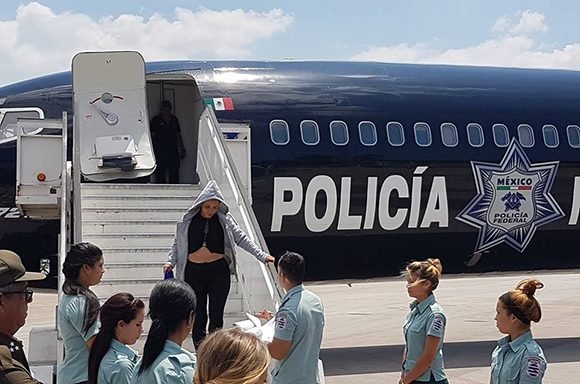
In less than a month, approximately 300 Cubans arrived on the island in five deported flights. Photo: Talia Gonzalez/ Facebook.
With information from Prensa Latina.
Media silence on LGBTI march

What the media doesn’t say about the LGBTI march in Cuba
By Redacción Razones de Cuba
May 16, 2019
Translated and edited by Walter Lippmann for CubaNews
There are many images that swarm in social networks and in different international press media about the march that last May 11 which was called by some “independent activists” of the Cuban LGBTI community. In the vast majority of them, there is a morbid delight in showing the detention of four people who insisted on continuing the march, disregarding the considerations of the authorities who, in the absence of an official permit, urged the participants not to continue marching through traffic-filled streets.
In the video that Razones de Cuba shares with its readers, we see the exchange between a PNR official and several of the demonstrators, without any weapon whatsoever, in a tone of respect and logical argumentation. The media tends to silence these details, trying to show that the march was repressed in its entirety and not to give birth to these testimonies that the vast majority of the participants in the demonstration held a dialogue with the authorities, without outbursts or any desire to break with institutionality.
Respect, reason, and peace: cardinal points of citizen tranquility, for the search in Cuba of individual and general well-being under the rule of law.
Does Biden Have What It Takes?

Does Joe Biden Have What it Takes to be the Democratic Presidential Candidate?
By Fernando M. García Bielsa
(Specialist in North American issues. He has published in Cubadebate and other Cuban and foreign websites.)
April 26, 2019
Translated and edited by Walter Lippmann for CubaNews.
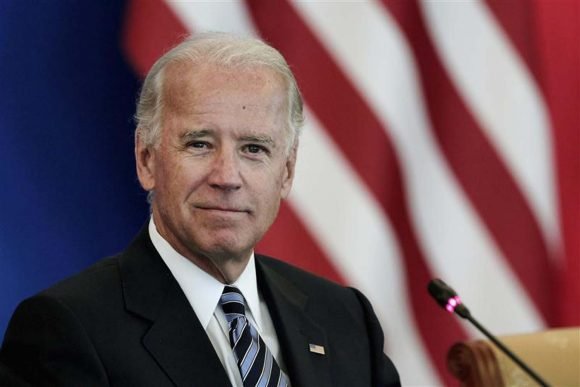
Photo taken from Diario público
Former Vice President Joseph Biden has just officially announced that he is running for the Democratic Party’s nomination for the November 2020 presidential election in the United States.
Covered in a cloak of false moderate or center positions, Biden is willing to come to the rescue of the corporate political establishment at a time when, between the electorate and the base of that party, demands and positions of support for a popular agenda have Abecome predominant.
Joe Biden is of course the best-known figure at the national level – among more than fifteen other politicians who are in the running for the Democratic nomination – perhaps with the exception of social democrat Bernie Sanders, who was much admired after his successful grassroots campaign in 2016.
A few days ago, the NY Times reported that Democrats who are part of the “Stop Sanders” effort are distressed by the momentum of the effort. A headline in the Washington Post said, “Center Democrats fear that far-left positions will lead to defeat in 2020. So they are pushing for alternatives.
In addition to having a name that part of the public identifies, Biden adds other advantages such as the favor of the country’s political and financial elite. With it comes access to the coffers needed to wage a successful and costly electoral campaign, as well as the favor of the national machinery of the Democratic Party. Also, it is supposed, he would also be assured of favorable coverage by the big media and television networks.
However, this politician also has his disadvantages before a rather skeptical electorate with clear tendencies to reject the same elite of Washington and Wall Street and, in general, those who conduct politics in the U.S. capital, a trend that has become more marked in recent years.
Joe Biden is 76 years old; he has been a member of Congress for no less than 36 years and vice president of the country for another eight during the Obama Administration. He is undoubtedly the oldest and most skillful of those serving the country’s among those who have announced their presidential aspirations.
Although with an image of center positions, his alignment with corporate and financial interests is very broad. It has been part of the corresponding game with policies in favor of big business, banking, insurance companies and the unanimously-favored increase in military spending, financial deregulation, and so on.
Like almost all Democratic politicians and presidential hopefuls from the Clinton and Obama currents, which are the ones that have hegemony in the party, Biden has a good arrival and relations with established elites in the African-American sectors and the union world.This is not the same as saying that he has real acceptance or descent from the workers or the so-called black or Latino communities.
One should not underestimate the strong and already established attitude of rejection, mentioned above, which has shown a large part of the U.S. electorate has shown toward towards politicians and elites in general.
These are factors that conspire against Biden’s potential, even though he has the advantage of being close to the establishment, the holders of the money and the favor of the big media.
Another issue to consider is the apathy of voters, also a longstanding trend that particularly affects Democrats when counting votes. Part of the factors that led to the defeat of Hillary Clinton in 20l6 was that by forcing her nomination, favoring her with all kinds of manipulations, the structures and leadership of the Party, they frustrated the possibility of motivating and energizing its base, as independent Senator Bernie Sanders was doing.
It is considered that for this electoral cycle and in order to defeat the Republican candidate, who most likely is the current president Donald Trump, it will be necessary to mobilize and give new energy to the Democratic electorate and rescue part of the popular sectors that it took from them.
Although this is definitely a party of the system, it will have to moderate its neoliberal propensity to reconnect to some extent with its base, with the so-called middle classes, a good part of them workers, and with many people disappointed with politics, and with the neglect and deterioration of their living conditions.
That was part of what gave Trump in 2016 the opportunity to manipulate anger and deep dissatisfaction among Americans with the country’s dysfunctional political system. Particularly the games symbolized on Wall Street and in the federal capital, and by the disconnection of the political spheres from the common people.
Although with a less unpleasant figure than Hillary Clinton, the Democrats, with Joe Biden (who resembles her in many substantive respects), could run the risk of repeating her discouraging and failed campaign in the last election cycle.
Biden has a history of openly defending capitalism and an underhand evasion of class inequalities. A long record and sequel to his positions that could make him vulnerable to his opponents during the coming months of the campaign, and in the home stretch if he were nominated, a record that includes expressions of racist type, of marked support for war, of favoring the deregulation of the banks, etc.
Or the fact that he has shown himself to be harsh in the face of crime, even to the point of insensitivity, as when he said in a speech before the full Senate in 1993:
“It doesn’t matter whether or not they are people who have been in need or marginalized in their youth. It does not matter whether or not they had a past that allowed them to be part of the social fabric. It doesn’t matter whether or not they were victims of society. The end result is that they are about to beat my mother…, shoot my sister…”, etc.
He is pointed out as a firm acolyte of the Military Industrial Complex. From his powerful position as chairman of the Senate Foreign Relations Committee in 2003, Biden provided political cover for the massive military attack on Iraq authorized by Republican President George Bush. Some have said he did more than any other Democratic senator to get the green light for the invasion.
The forgetful citizenry may only have a nebulous image of this personality whose name is familiar to them, but much is the burden and complexity of his political record. For Biden to get the Democratic presidential nomination next year, it will depend largely on how many voters in the primaries would or would not have known about the background of this consummate politician; how much of his actual record will come to the fore in the coming months.
Although it’s too early to say, and even considering that money and the big media will pull the embers into their frying pan, I estimate that, in the long run, the Democratic Party structures, to some extent pushed by the rank and file, will favor a “new face” from among the dozen or more presidential hopefuls who have already thrown their had in the the ring for the Democratic nomination at the national convention to be held in July next year in the city of Milwaukee, Wisconsin.
In photos: Lina Ruz, Fidel and Raúl’s mother

In photos:
Lina Ruz, Fidel and Raúl’s mother
By Equipo Editorial Fidel Soldado de las Ideas
Translated and edited by Walter Lippmann for CubaNews.

Lina Ruz in her house in Birán, in 1958. Source: Oficina de Asuntos Históricos del Consejo de Estado / Sitio Fidel Soldado de las Ideas.
On the occasion of Mother’s Day, Cubadebate and the site Fidel Soldado de las Ideas share images of Lina Ruz, Fidel’s mother, whose children “(…) treated her more naturally and confidently. She established order and schedules, wrapped them under the blanket at bedtime, bathed them and dressed them, guessed their spirits, and even ran after them or slapped them when they had gone too far in their mischief. But this happened if she managed to reach them, if she managed to capture them, because the boys, especially Ramon and Fidel, already knew her and escaped the slightest evidence or threat of punishment. All her kindness, Lina dumped in loving care and sleeplessness, without forgetting her obligations at the front of the house”.
Excerpt from the book Todo el tiempo de los cedros: Family landscape of Fidel Castro Ruz, by the author Katiuska Blanco Castiñeira.
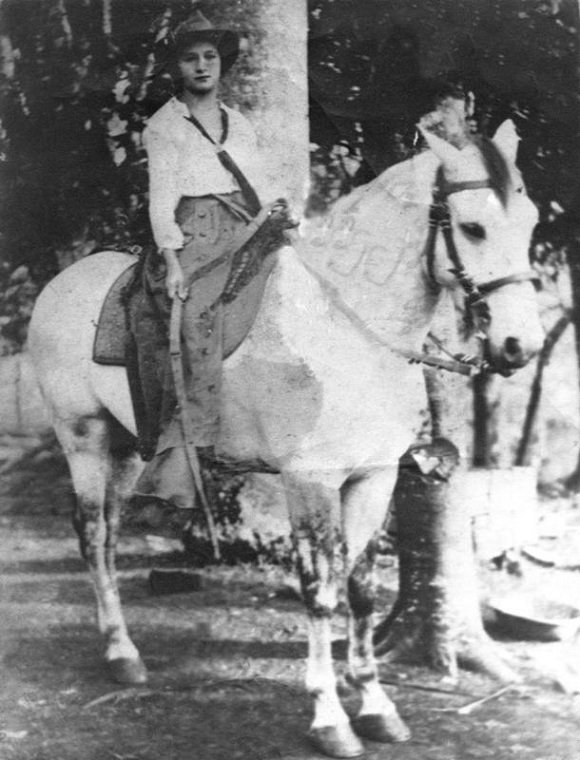
Lina Ruz in Birán, 1925. Photo: Oficina de Asuntos Históricos del Consejo de Estado / Sitio Fidel Soldado de las Ideas.
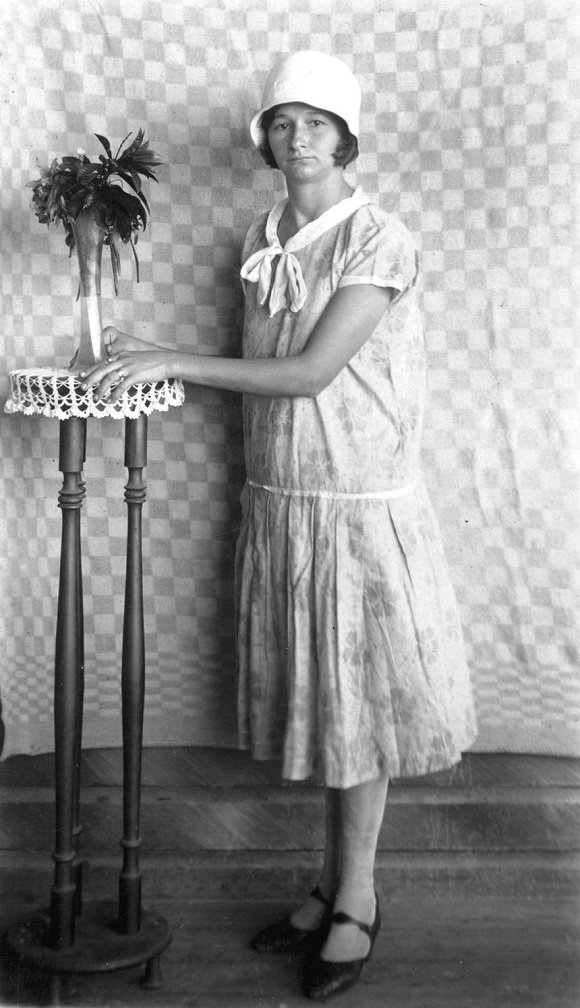
Lina Ruz. In the dedication of this photograph can be read: “My dear friends Paciano and Julia. With all the affection of her always friend. Lina de Castro Birán. 10-4-1926” (According to the date noted at the foot of the dedication, there were only about four months left for the birth of Fidel) / Sitio Fidel Soldado de las Ideas.
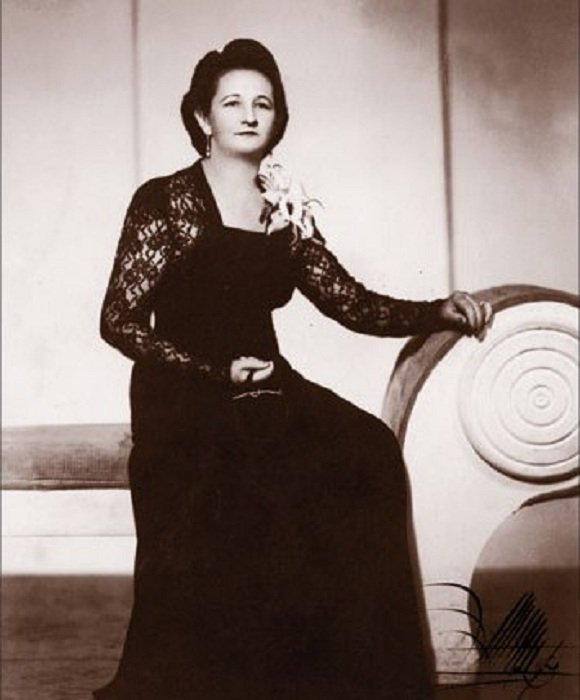
Lina Ruz, dressed for Fidel’s graduation as a High School Graduate in Bethlehem, June 1945. Source: Book: “Fidel Castro Guerrillero del Tiempo” / Sitio Fidel Soldado de las Ideas.
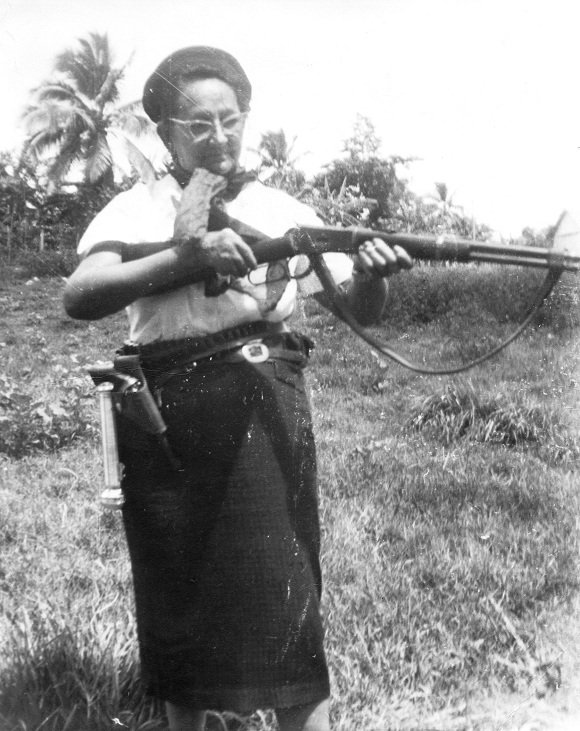
Lina Ruz during the visit to her son Raúl, in the Second Front, in 1958 / Sitio Fidel Soldado de las Ideas.
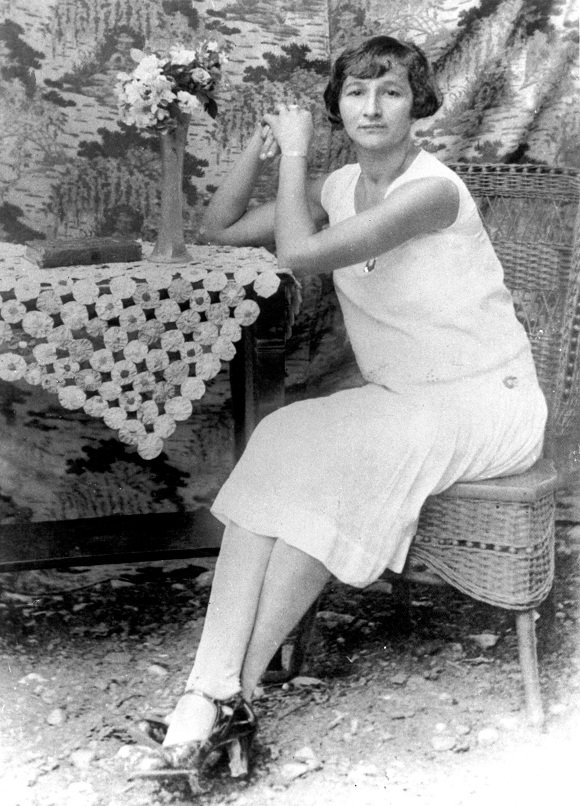
Lina Ruz in her house in Birán. Fountain: Oficina de Asuntos Históricos del Consejo de Estado / Sitio Fidel Soldado de las Ideas.
To learn more about the ideas of the leader of the Cuban Revolution, visit our site Fidel Soldado de las Ideas. Follow us on Facebook and Twitter.
Winston Churchill in Cuba

Winston Churchill in Cuba
By Ciro Bianchi Ross
Translated and edited by Walter Lippmann for CubaNews.
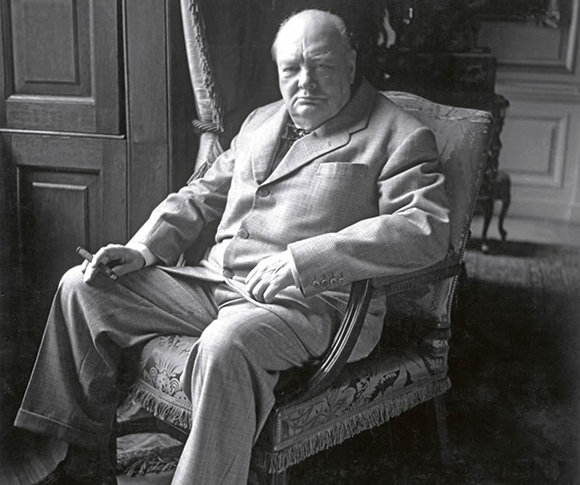
Winston Churchill. Photo: Diners magazine.
Former British Prime Minister Winston Churchill was given in Cuba, in 1946, the treatment of head of government, and the National Hotel reserved for him, of course, the Apartment of the Republic, which was intended for the most distinguished official guests. During the Second World War, the press had made his image of a good-natured and implacable grandfather habitual at the same time. He was an insatiable smoker of cigars. When he leaned out of the door of the Boeing 17 that brought him, he raised his right hand and with his index and middle fingers in the shape of a vee he greeted the crowd waiting for him at the Rancho Boyeros airport and applauded him enthusiastically: Sir Winston repeated for the Havana people the sign of victory, a gesture he coined throughout the war.
And there began the headaches for the Cuban protocol and the British legation in Havana, because the former premier did not respect timetables or formalities and was governed only by what the day had in store for him. He would get up at five in the morning and from that moment on he would put the entire hotel in check. One rainy day, annoyed because he could not take his usual dip in the pool, he suddenly ordered that they pack their bags to leave and asked them to get rid of them as soon as the sun came up. He spent his free time playing cards with anyone who wanted to join him. “He eats, drinks and smokes without restrictions of any kind. And in quantity,” wrote Enrique de la Osa in his report on the visit.
It was the second time Winston Churchill had visited our country. Many years ago, in 1895, he had celebrated his twenty-first birthday here. The then young officer of the fourth Regiment of Hussars came in his personal capacity to see the war that the Cubans were waging for their independence against Spain, and here the future Lord of the British Admiralty received his baptism of fire. At that time he also became fond of Cuban rum. He says so explicitly in his memoirs.
What was Winston Churchill looking for in 1895 in these lands? He said it clearly in his book: the adventure for the adventure itself. He was anxious to know what a war was like.

Young Winston Churchill. Photo: Archive.
Churchill came from Sancti Spiritus with a Spanish troop of three thousand men moving towards Arroyo Blanco. He marched on horseback for hours and made campaign life: he slept in a hammock, bivouacked with the troop, bathed in the rivers… Days passed and nothing happened, until one morning, at breakfast time, his group was surprised by a closed discharge coming out of the nearby forest and a horse that grazed peacefully next to Churchill received a fatal wound on the side.
The Spaniards rushed to where the shots came from and found no one. Churchill had already been warned that in Cuba the enemy was everywhere and nowhere… “When I witnessed all these operations I could not help but think that the bullet that had hit the horse had certainly passed one foot from my head. So, at least, it had been under fire. It was something,” says the former prime minister in his memoirs. He understood the situation: Spain would be ruined and bleed to death in front of a ragged army armed, above all, “with a terrible knife called a machete”. It was a weapon handled by soldiers for whom war “cost them nothing, apart from misery, dangers, and privations”. But even so, Churchill sympathized with Spain. Rather, he felt sorry for the Spaniards.
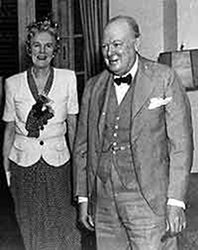
Winston Churchill with his wife during his stay at the National Hotel in Havana in February 1946.
Let’s go back to that Havana of February 1946. Churchill asked to be driven through the city in a convertible car and since Cuban protocol did not have a similar vehicle, the owner of the Partagás cigar factory offered his and he himself gladly served as a driver in exchange for the visitor reciprocating with a visit to his company, in which he was pleased. One of the traditional vitolas of the Romeo y Julieta brand bears the name of the British politician. Pinar del Río distinguished Churchill with the title of Favourite Son. He spent a whole afternoon locked up in the brothel of Marina, in Colón Street. His aide during his stay on the island was the then young lieutenant José Ramón Fernández.
Churchill’s lunch with President Grau San Martín, whose menu is still maintined, was tinged by the anecdote. Sir Winston left for the Presidential Palace with all the packing that the occasion required only to return to the hotel a few minutes later… I had forgotten the cigars. Then, another unplug: the retinue had to go round and round around the Palace for ten minutes so that the former premier and the president would meet at the scheduled time.
At the end of lunch, Grau forced Churchill to go out to the North Terrace before which many Havana citizens were waiting to greet him.
Churchill said: “I feel very pleased in this beautiful Island of Cuba where I have been so well received…”. And he continued, in Spanish: “I take the opportunity to say: Long live the Pearl of the Antilles!
At the end of his stay, he made another enthusiastic statement: “If I didn’t have to see President Truman, I would stay here for a month.

Churchill was an insatiable cigar smoker. Photo: Archive.
Coppelia will recess its services

Coppelia Ice Cream will recess its services from May 2 to June
Translated and edited by Walter Lippmann for CubaNews.
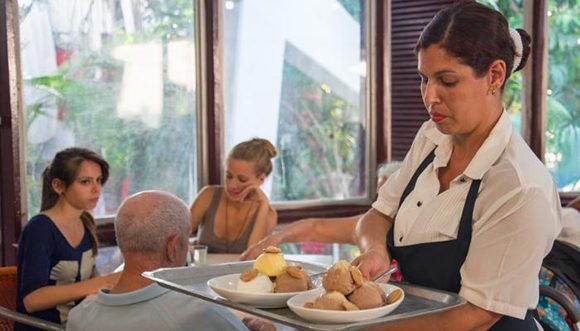
Coppelia ice-cream parlor. Photo: Joyme Cuan/ Tribuna de La Habana.
The Coppelia ice cream parlor, located in the central streets L and 23, in Havana’s Vedado, will close its services to the public for maintenance and repair work from next May 2 until June, and simultaneously will also cease production of the ice cream factory of the same name.
According to a note to our editorial staff, “the objective is to make technological improvements in the factory, improve the ice-cream production processes, and create the conditions for the definitive and stable production of Coppelia ice-cream.
“Taking advantage of this stop, improvements and maintenance actions will also be carried out in the ice-cream parlor, which will allow a better service to the population and the rescue of offers that have always characterized this emblematic site of the capital”.
We hope that the changes are not only structural, but that the reopening will lead to an improvement of the service, Achilles’ heel of the installation.
Subscribe to Blog via Email
| M | T | W | T | F | S | S |
|---|---|---|---|---|---|---|
| 1 | 2 | |||||
| 3 | 4 | 5 | 6 | 7 | 8 | 9 |
| 10 | 11 | 12 | 13 | 14 | 15 | 16 |
| 17 | 18 | 19 | 20 | 21 | 22 | 23 |
| 24 | 25 | 26 | 27 | 28 | 29 | 30 |
| 31 | ||||||

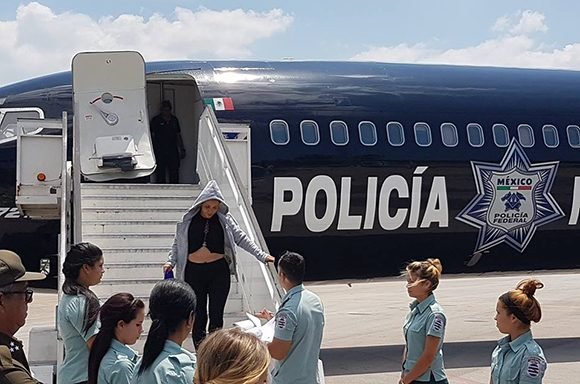
You must be logged in to post a comment.